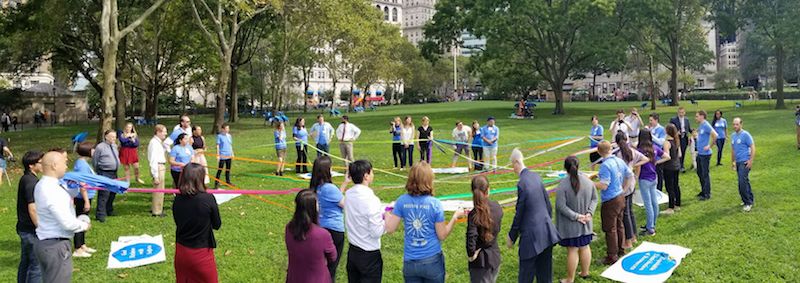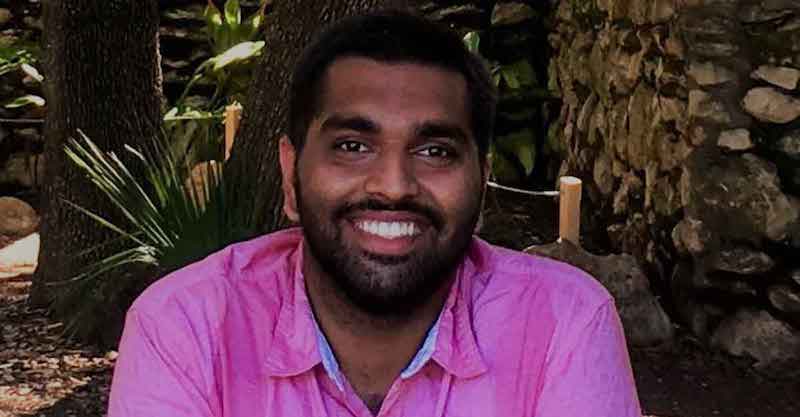
NEW YORK, NY (TIP): With headlines filled with examples of rage, violence and disaster in every news cycle, New Yorkers took a moment on the International Day of Peace to celebrate some of the people and organizations that make communities safe and livable, and remind citizens that everyone has a stake in keeping neighborhoods, cities and countries peaceful.
Two leading peace organizations, the Institute for Economics & Peace (IEP), and Outward Bound Peacebuilding (OBP) brought together eight civic organizations in a colorful ribbon display that brought to life the Positive Peace framework. The Positive Peace framework includes eight pillars derived by IEP using statistical analysis to identify the factors that contribute to peace. The eight pillars include: a well-functioning government, a sound business environment, the equitable distribution of resources, low levels of corruption, high levels of human capital, the acceptance of the rights of others, the free flow of information, and good relations with neighbors.
“Peace is much more than a lack of violence,” said Michelle Breslauer, Program Director from the Institute for Economics and Peace. “Understanding what contributes to building trust and cohesion is key to peaceful societies. While these eight factors sustain peace, they cannot be viewed independently. It is crucial that we understand how they relate to each other and how the entire system can be strengthened. Today we are bringing this system to life,” she continued.
“Sustaining and investing in peace is a shared responsibility,” said Ana Patel, Executive Director of Outward Bound Peacebuilding. “That’s why we are bringing New Yorkers together today to connect to and learn from these eight pillars of peace. This is a call to action for all New Yorkers to become peacebuilders.”
Eight leading civic organizations were selected to represent each of the pillars:
SOUND BUSINESS ENVIRONMENT: Dr. Jasmin Cowen, President, Rotary Club of New York
WELL-FUNCTIONING GOVERNMENT: Jerry Weinstein and Ray Shah, Co-Founders, The Freedom Threat Index
EQUITABLE DISTRIBUTION OF RESOURCES: Matthew Botwin, Board Member, CAMBA
FREE FLOW OF INFORMATION: Daniel Hyslop, Research Director, Institute for Economics and Peace
GOOD RELATIONS WITH NEIGHBORS: Laura Gonzalez-Murphy, Director, New York State Office for New Americans
HIGH LEVELS OF HUMAN CAPITAL: Professor Tom Hill, Director, Initiative for Peacebuilding through Education, Center for Global Affairs, New York University and Elizabeth Bishop, Director of Curriculum and Outcomes, Global Kids
ACCEPTANCE OF THE RIGHT OF OTHERS: Alex Rizio, Supervising Attorney & Co-Coordinator of the Unaccompanied Latin American Minors’ Project, Safe Passage
LOW LEVELS OF CORRUPTION: Zoe Reiter, Representative to the US and Senior Project Leader, Transparency International
The Positive Peace activity builds on a successful collaboration in May 2017 between IEP, OBP, and Rotary International that saw 300 Mexican youth map the eight pillars.
Each year, the International Day of Peace is observed around the world on 21 September. It was established in 1981 by unanimous United Nations resolution, to provide a globally-shared date to commit to building a culture of peace.
About the Institute for Economics and Peace
The Institute for Economics and Peace (IEP) is a global think tank dedicated to shifting the world’s focus to peace as a positive, achievable, and tangible measure of human well-being and progress. IEP has offices in New York City, Sydney, Mexico City, and The Hague. It produces the annual Global Peace Index, the world’s leading measure of global peacefulness.
About Outward Bound Peacebuilding
Outward Bound Peacebuilding (OBP) uses the Outward Bound approach of experiential learning in the outdoors to challenge and inspire leaders in divided societies to build peace. OBP works with partners around the world to design programs that embrace traditional Outward Bound values and approaches to learning by doing, with a special emphasis on compassionate leadership, cooperative learning, and creative action. OBP calls this Experiential Peacebuilding. Since 2009, Outward Bound Peacebuilding has challenged and inspired more than 200 peacebuilding leaders from 25 countries throughout the world.
(Based on a Press Release)





Be the first to comment